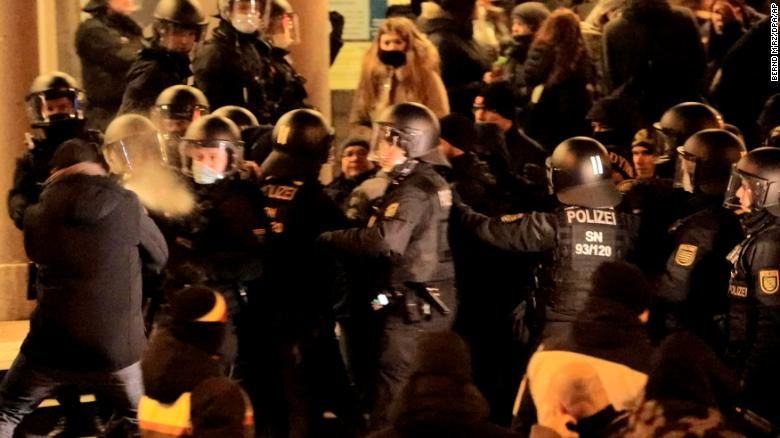Protesters tossed bottles and fireworks at police in eastern Germany on Monday night in some of the most violent demonstrations against public health measures in Europe since the Covid-19 pandemic began.
Hundreds of people gathered in various cities and towns on Sunday and Monday to voice their opposition to stricter social distancing rules that went into effect Tuesday across Germany. Gatherings are now limited to 10 people for those vaccinated or recovered from Covid-19, while households with unvaccinated people must not meet with more than two other people from one other household at a time.
Some 500 people marched to the city center in the city of Bautzen, in Saxony, late into the night Monday in violation of public health regulations, some of them carrying anti-vaccination signs. Twelve police officers were injured and twelve emergency vehicles were damaged as protesters clashed with police.
Scuffles broke out in several parts of the state, Saxony police said, while television footage showed demonstrators throwing objects and shouting insults at officers.
Twenty-three people were criminally charged and another 183 were hit with less-serious administrative violations, police said.

The protests in Germany come as Europe prepares for a surge in new coronavirus cases heading into the New Year holiday. While there remain pockets of communities opposed to Covid-19 vaccines and social distancing measures throughout the continent, anti-vaxxers have become increasingly violent in eastern Germany, which has been the scene of many protests and where the uptake of vaccines is lower than the national average in most states.
Similar scenes of violence played out on Sunday in various places, including the Bavarian town of Schweinfurt, where hundreds of protesters also violated public health regulations to gather. Eight police were injured after being punched and kicked there, authorities said.
A 27-year-old woman was criminally charged after she was accused of trying to break police cordon in the town with her 4-year-old child in tow, both of whom were pepper sprayed, authorities said.
Politicians and media outlets have reportedly received packages containing raw meat and threats from alleged anti-vaxxers, and, earlier this month, authorities uncovered a purported plot to assassinate Saxony Governor Michael Kretschmer. Kretschmer has been pushing for people in his state to get vaccinated and receive booster shots. Six people were arrested and questioned in relation to the allegations but later released.
Germany's vaccination rate lags behind its neighbors in Western Europe, with 70.9% of the population having received both of their doses. Saxony's vaccination rate, at 63%, is the lowest of any German state. German health authorities have said that more people need to be vaccinated to protect the country from a new wave of cases driven by the increase of the Omicron variant across Europe during the holiday season.
Germany earlier this month put in place a nationwide lockdown for unvaccinated people, banning them from accessing all but the most essential businesses.
New Chancellor Olaf Scholz supports mandatory vaccinations and wants a law drafted that could be voted on by the parliament in late February. Parliament is due to meet in early January to begin discussions.
Governments across Europe have in recent days enacted new measures to limit public gatherings, fearing that Omicron could overwhelm hospitals given how fast it's spreading, especially among the unvaccinated.
Germany's Constitutional Court also ruled that legislators need to set triage rules if intensive care units fill up with coronavirus patients. The German Intensive Care and Emergency has said that only one sixth of all ICU beds in the country are available.
After reporting a record-breaking 104,611 Covid-19 infections on Christmas Day, France enacted a series of restrictions Monday limiting where people can eat, mandating more work from home options when possible, and curtailing the size of public gatherings. However, the government stopped short of putting in place curfews or lockdowns and will let local leaders to decide whether they need to implement outdoor mask mandates.
Italy will close all nightclubs and bars in January, while Portugal closed schools, bars and clubs until January 10. Spanish authorities have reinstated a nationwide outdoor mask mandate and six northern regional governments have agreed to coordinate early closing hours for restaurants, bars and nightclubs -- a move affects 14 million people, about 29% of Spain's population.
Madrid, however, will be one of Europe's few major cities to ring in the New Year with a large celebration. Barcelona and Valencia have canceled their fireworks displays in a bid to get people to stay at home. Berlin, London, Paris, Rome and Venice have also axed their traditional festivities.















